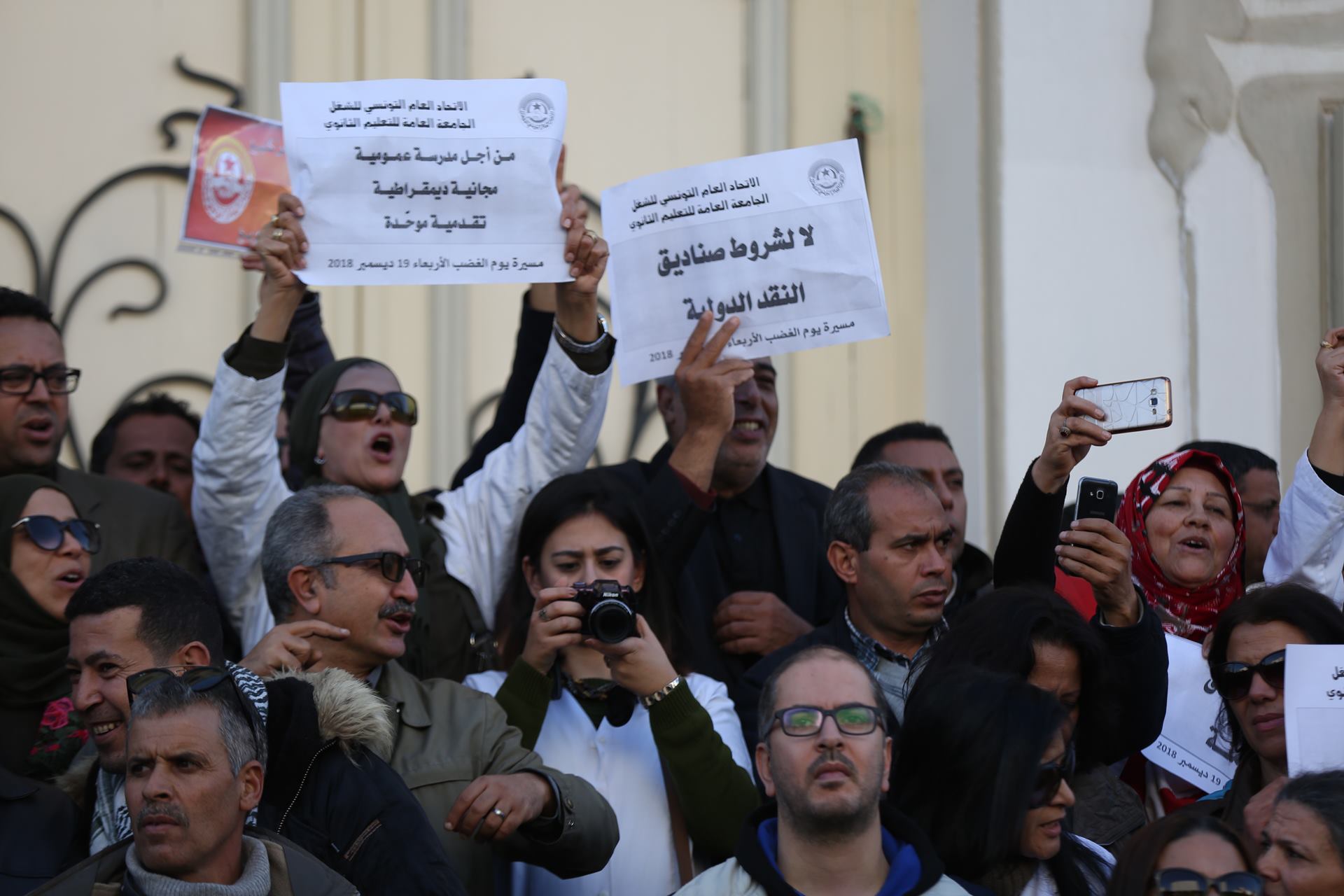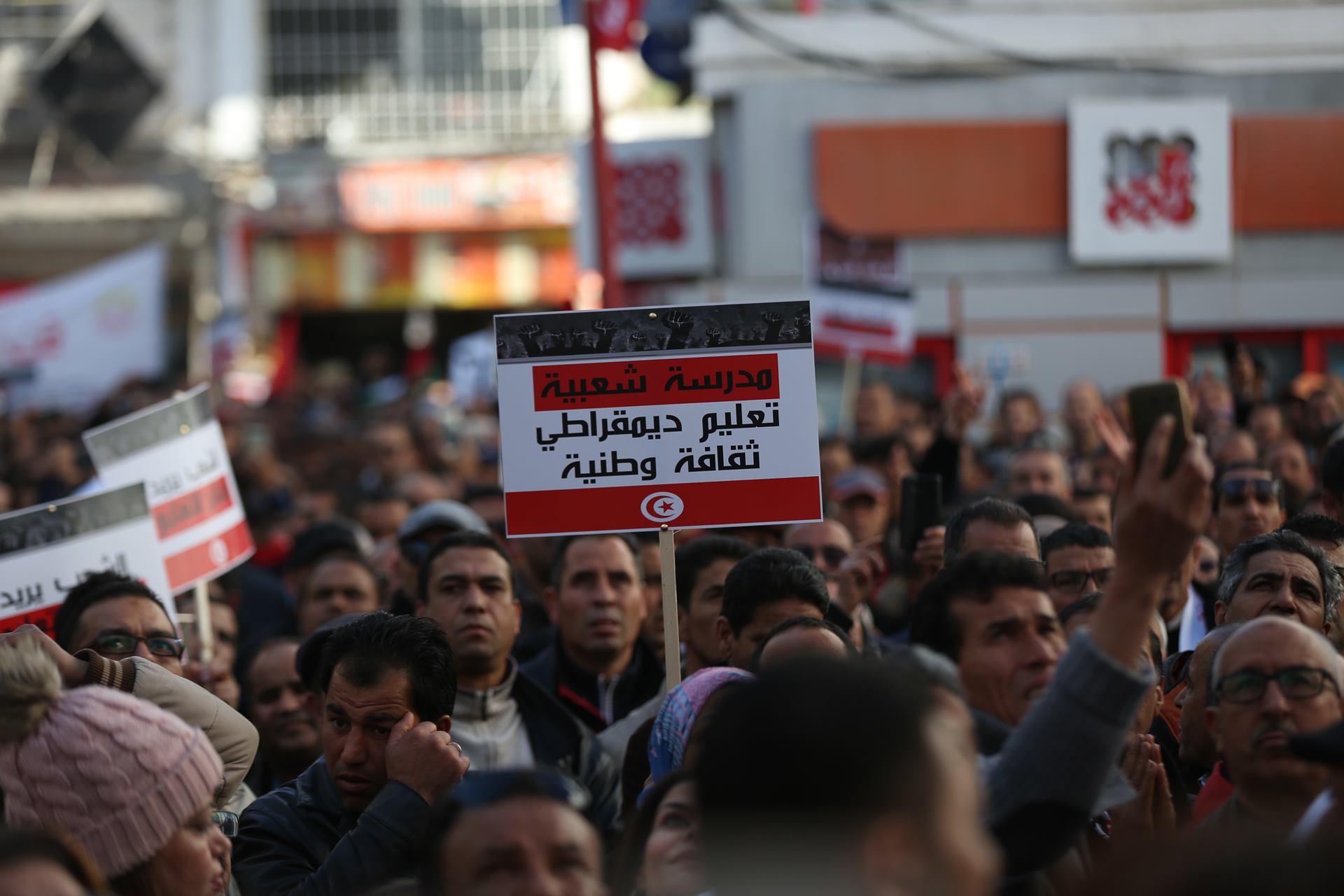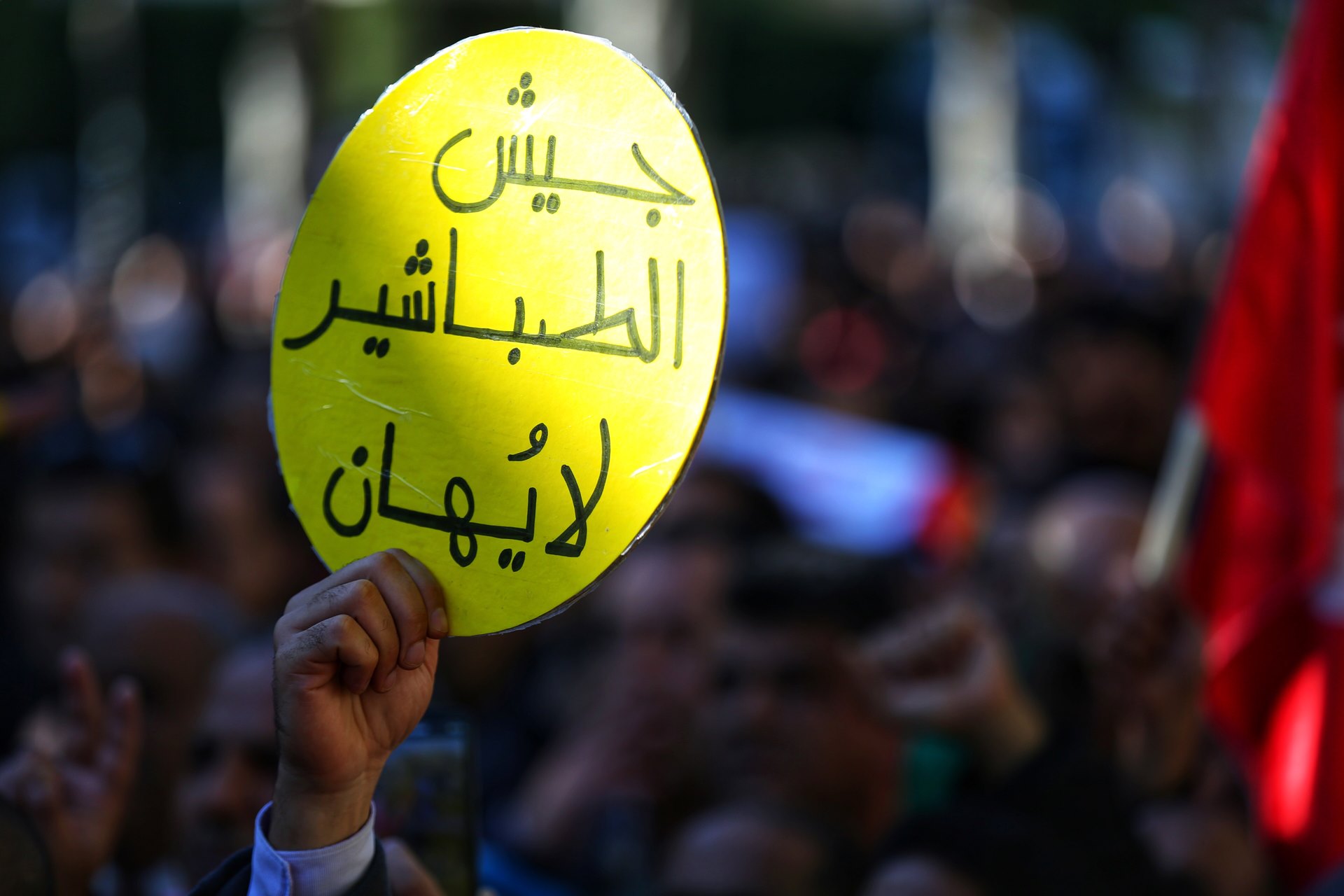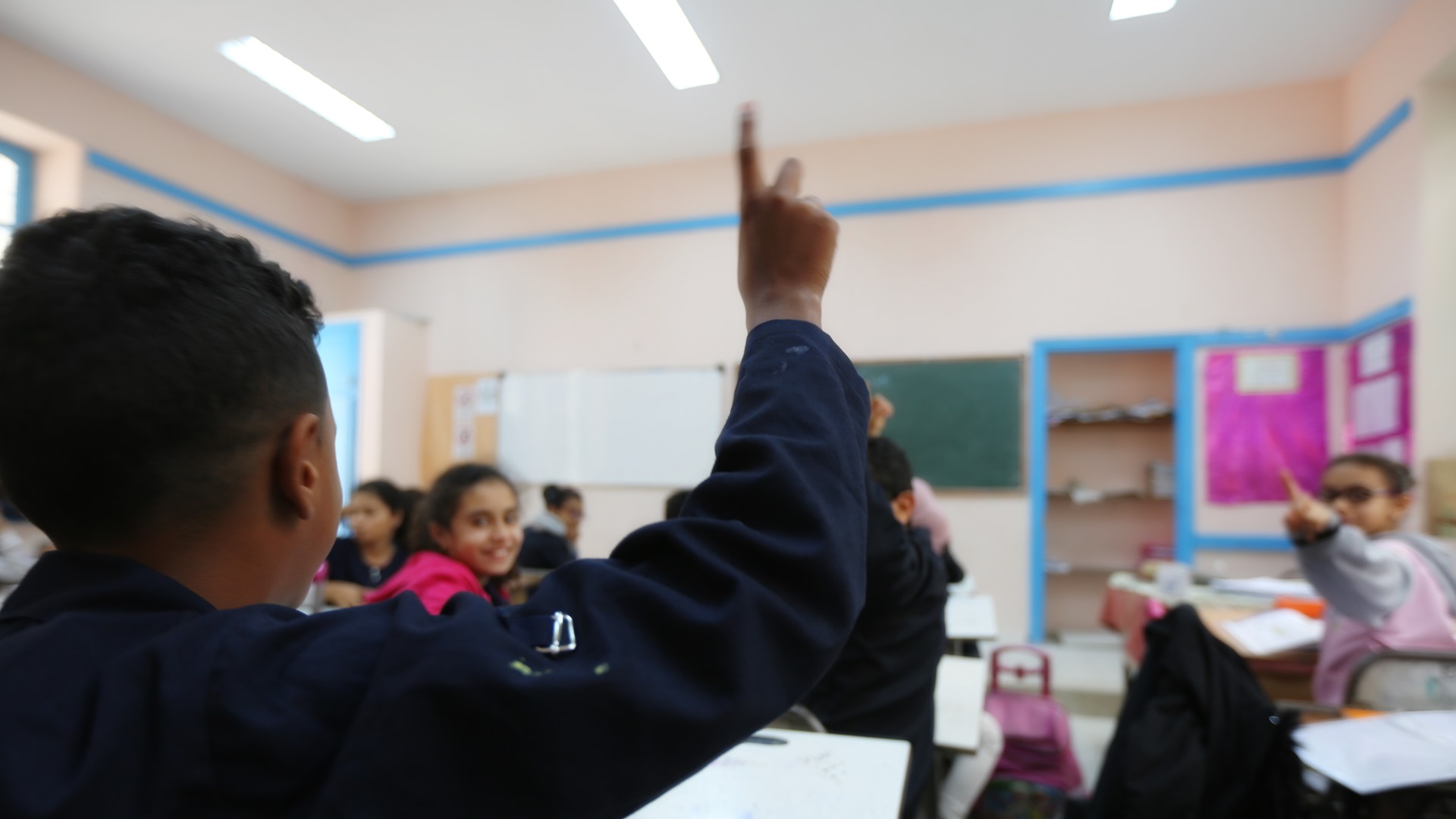Hayet estimates that there are 3000 teachers this year in the same situation as her, working without a contract. However, they depend on the Ministry of Education. They are hired under a subcontract, which does not entitle them to social security coverage. "I don't have a CNRPS (National Pension and Social Welfare Fund) coverage, I don’t have anything", lamented the teacher.
Hayet has always worked without status. In 2006, she started working as a substitute teacher for a 120 dinar salary for each month worked. Two years later, substitute teachers' salaries were increased. "A maximum of 400 dinars". "You don't get paid for breaks. You only get paid for the hours you teach," said the teacher. Over a school year, she gets an average of 230 dinars per month.
The teacher started working before even completing her Master's degree in 2010. For the preceding four years, she was able to teach with her University Diploma of Literary Studies (DUEL). This degree allows language teachers to work as substitute teachers while pursuing their degrees.
A couple of years later, in October 2013, an agreement on the recruitment method for substitute teachers was signed. They are now registered in a database that sorts them according to subjects and school districts, and classifies them based on their experience in terms of number of months worked.
Based on their ranking, teachers are given positions for varying lengths of time - up to one school year - in schools affiliated to their local districts. Each academy has its own method of paying teachers. They can be paid by trimester, semester or school year.
"In the Greater Tunis region, it is by semester. In Sousse, Gafsa and Gabes, they don't get paid until the summer break. And sometimes they have to wait for two years!"
According to Lassaad Yacoubi, the national representative of the secondary education union, 3000 substitute teachers are working in secondary schools and more than 15.000 in primary schools. They are not the only ones though, as others are still waiting to be registered on the Ministry's database. They cannot teach without being on this list, and each year 10% of them are integrated.

Teachers' protest on December 19, 2018 in Tunis. "No to the International Monetary Fund's conditions". Credit: MK
Appalling conditions
Substitute teachers must teach between 9 and 18 hours a week, just like permanent teachers, although not all "contracts" are in line with that requirement. "For instance, there was one year when I taught 21 hours a week," said Hayet, whose income did not improve accordingly. On top of that, they have to prepare the curriculum and the lesson plans, and correct homework assignments.
"The substitute teacher should fill in for a permanent teacher on sick or maternity leave for a specific period of time, but we are occupying positions that are already vacant," explained the disenchanted teacher.
Hayet believes that these vacancies should be filled by teachers ranked at the top of this database, but as permanent teachers.
Another difference between permanent and substitute teachers is that those working under contract are entitled to certain bonuses, whether for transport or at the start of the school year. "We don't get anything", said Hayet, "they don't think of us as teachers".
The private school alternative
Some public school teachers may sometimes "straddle" several institutions. This means that they may teach in two institutions at the same time. The Ministry of Education allows this arrangement when the teacher's initial institution does not have enough classes to offer them so that they can fulfill their contract.
Hayet works several jobs but does not fit into this scenario. "Everyone does it, the substitute teachers as well as the permanent ones", she explained. Aside from her job in a public high school, she has been teaching 14 hours a week in three private schools since 2010, illegally. She has been using this money to get to the public schools by public transportation.
Unlike the public sector, where salaries are regulated by the Ministry, each private school has a different income scale, depending on the grade and type of subject. The smallest classes are taught for four dinars per hour, while the last years of high
school can reach up to fifteen dinars. For the Spanish teacher, whose subject is optional, each hour is worth ten dinars
"because I'm teaching for the baccalaureate exam". In public schools, the price is fixed: each hour is worth five dinars.
In order to be able to work in private institutions, the young woman started with an "introduction to working life programme" (SIVP). This contract spares the employers from having to pay the social security contributions for their employees. In this way, the CNRPS and part of the salary are covered by the State. " But now I'm working with them without a contract, just like on construction sites. You have hours to work, if you do it, you get paid, if you don't, you get nothing," she commented.
Despite the better pay in the private sector, the teacher does not plan to leave the public school system. If she were to make that decision, she would lose her spot in the Ministry's database and would no longer be able to teach in public schools. Besides, the higher salary in private schools only serves to cover up the same difficulties for public school substitute teachers.
Instead of having a fixed salary each month, Hayet only gets paid for the hours she teaches. If, for instance, she normally teaches a class on Thursday and the month includes holidays on Thursdays, the hours not worked are deducted from her salary. "And remedial classes, which you need to teach in order to complete the program, are not even taken into account," she added.
The working conditions are far from optimal and take their toll on both the teachers and the students. Hayet feels that private schools place too little emphasis on the students' success. The previous year, in one of the three private high schools where she was teaching, she told the administration that the Spanish mock exam was ready and that she was waiting for a time slot so that her students could sit for it.
The administration made it clear to her that optional subjects were not a priority. "And they didn't take the mock baccalaureate exam," Hayet recalled, "because they would have had to call in a teacher (to proctor the test) and that would have cost them money."
"Private high schools are commercial businesses, not educational institutions."

"Popular school, democratic education, national culture" Credit: MK
A year marked by protests
The 2017-2018 year has been one of many twists and turns, full of demands and strike movements. "During the back-to-school period, we decided to go on strike and cancel classes," Hayet recalled. At that time, the teachers learned about the introduction of a circular issued by the Ministry of Education on the criteria establishing the teachers' database, despite their strike movement. "We had no idea about this document but it was leaked," she commented.
This controversial circular provides that only teachers registered between the beginning of the 2008 school year and the end of 2013 will be considered. In case of vacancies due to a shortage of teachers in certain subjects, the positions may be filled by people that are not listed in the database.
A couple of weeks later, the Ministry of Education turned the screws even further by issuing a new circular, superseding the previous one. Instead of hiring teachers from outside the database to fill vacancies, the Ministry's solution was to hire substitute teachers from neighbouring education districts. "They call you to work elsewhere as a substitute and on top of that you have to pay the rent, the transportation... All this with 200 dinars per month ", added Hayet.
The young woman recalled when she worked in the Tebourba Governorate. "It's an hour drive. When I had a class at 8 am, I had to leave home at 6 am and go by bus", she stated, "and when you finish work at 6:30 pm, you only get home at 8 pm".
The teacher would go home feeling exhausted from her day's work. Nearly twenty substitute teachers were in the same situation as Hayet in the school. "That's two thirds of the teachers!", she said.
She believes that this circular puts the teaching profession at risk, since in addition to these restrictive measures, “it stresses the fact that substitutes who fail to show up for work will be removed from the database.”
At the start of the 2016 school year, the Ministry recruited 800 substitute teachers, a number far below the actual needs, lamented the professor, who said that the number of vacant positions keeps growing every year. For the 2017-2018 year, "there were 4 000 full-time vacancies, but there were only 400 hires," she estimated, adding that the start of the 2018 school year wasn't any better.
1200 temporary teachers are expected to be hired in the 2018-2019 school year. "It's just a drop in the ocean," retorted the teacher.
To offset the shortage of teachers, schools are forced to make classes bigger, so that as many students as possible can take their full course load. Hayet, an optional course teacher, is directly affected by this. "To learn a new language, the classroom needs to have no more than 15 people in it," the teacher explained, "but instead there are 36 or 37 students per class!"
The students' grades are directly impacted by overcrowded classrooms, which make acquiring new knowledge more challenging for them. Hayet said that the Ministry puts the blame squarely on the shoulders of substitute teachers, claiming that their lack of competence is the main reason for the poor results.
There were, however, several exchanges between substitute teacher representatives and Ministry of Education officials who reportedly denied any responsibility. "Too bad for you", one of them allegedly said to the teachers.
"Too bad for us? But at the same time you need us, and yet there is no recruitment, there are no permanent contracts", said the teacher angrily. "We will always be the Ministry's slaves". The priority for substitute teachers is to get recruited as permanent teachers again.

"The chalk army will not bend." Credit: MK
Unlawful alternatives
Hayet is ranked at the top of the database as a Spanish teacher in her school district. After spending more than 10 years as a substitute, she would like to become a permanent teacher. But the situation doesn't seem to be improving, so some teachers have decided to find other jobs, which are often undeclared. Private tutoring is one of them, as it allows them to earn more money.
Individually or in small groups, students often pay for private tutoring with their teachers. "Everyone does it, whether it's substitute or Ministry teachers," she stated. "It's forbidden, and there are people who report those who still do it".
Hayet also recalled a former colleague of hers. The man spent several years on the waiting list, but his ranking did not allow him to teach. Having mouths to feed, he had to find another job, one that had nothing to do with teaching. "If a teacher is asked to substitute and declines, they lose all their rights," she noted.
Hayet has also turned to that option until 2014. "I worked as a seamstress, as a painter on construction sites", she recalled. She then used that money to cover her transportation costs when she would go to teach.
Weary of the pace of her work, she decided to make do with extra hours in private schools. Her husband also helps her in her daily life, "he bears all the expenses, our two daughters' and mine," she explained. When he gets fed up, he sometimes tells his wife, "I take care of you, not the ministry."
Some of Hayet's colleagues are in an even worse situation, forced to evade transportation fares to get to their place of work. If they are transferred to another school district, only a few of them would be able to afford to relocate and commute long distances every day.
But the impact of this job instability does not stop there. Teachers have to endure a great deal of stress, as they can never really make long-term plans.
Corruption within the database
But the problems don't end there. The teachers' database is in itself a source of many conflicts of interest and suspicions of corruption, since the substitute teachers' professional lives depend on the rankings established by the Ministry.
The more experience a teacher has in teaching their subject, the more likely they are to get long term replacements. However, in order to obtain a certain position, there are frequent instances of misuse. "In some school districts, the teacher gets contracts based on the contacts they have. It's a matter of favoritism!" exclaimed Hayet, "The trafficking is done from within the database. The corruption is at the level of the spots".
"Some school districts even split up vacancies between different teachers! Students meet a new teacher every month."
The main problem is that substitute teachers cannot see the list of vacancies, but only their personal ranking. This prevents them from recognizing any misuse within the database.
Other teachers with limited professional experience would have no problem paying, if they could afford it, to move up in rank. That is not the case for Hayet. "I fight for my rights, every year", she proudly explained.
Yet, she recalled that the Ministry of Education had a vacancy filled by one of her former students two years ago. She was only given a substitute position, even though she is one of the highest ranked teachers on the database. As far as she is concerned, it is clear that her student either knew someone at the Ministry of Education or had to pay to secure a position.
Many teachers, whether union members or not, have been protesting against the terrible conditions in which they are forced to work. But these movements are not risk-free for teachers. Some of them fear that they will be dropped from the database because of their involvement in strikes and other demonstrations.
Because of their large number compared to the few positions available as well as the working conditions, substitute teachers often find themselves in a vulnerable position where the spirit of solidarity is broken. They know full well that if they don't teach their classes, other people wouldn't hesitate to take their place.




